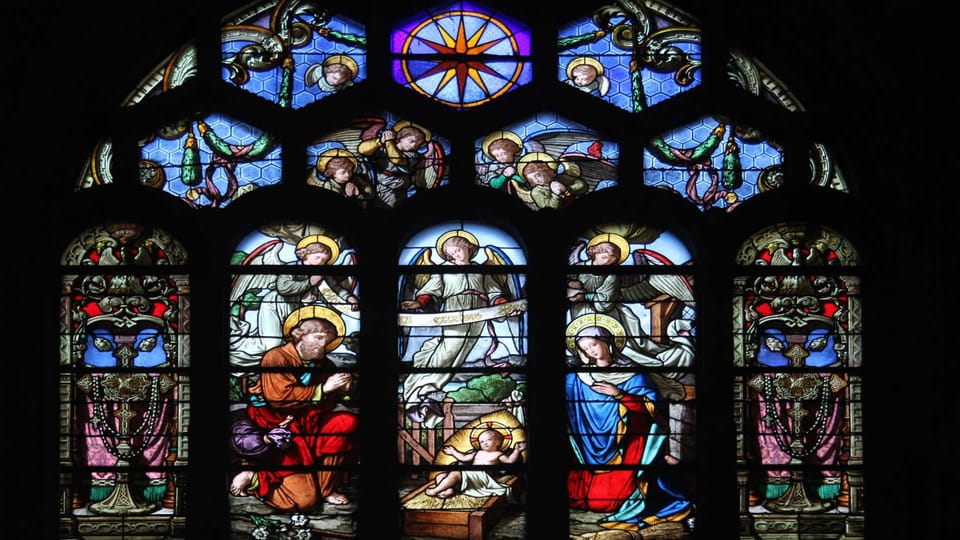Humble on Earth, Famous in Heaven (Luke 2:1-21)

Big Idea: What God does tends to be humble on earth but famous in heaven.
You may not follow Royal gossip, so you may have missed the news. Meghan Markle, the Duchess of Sussex, sparked a social media frenzy by closing her own car door at her first solo event in September. Arriving at the Royal Academy of Arts, Meghan stepped out of her car, then she shut it behind her. Some praised her “down to earth” and “humble” attitude, while others joked she may put someone out of a job.
Etiquette expert William Hanson pointed out that this was not in fact a protocol breach. “Usually, if you are a member of the royal family or a dignitary, you have a member of staff to open and close a car door for you.” He said this was for security reasons rather than “airs and graces.”
It appears the person who opened the door then stepped out of the way to allow the Duchess, 37, to greet her host and then close the door behind her. “A princess who still takes the time to shut her car door. Well done Meghan,” the Sun's royal correspondent Emily Andrews tweeted.
In an even more shocking event, the world did not understand when the King of Kings humbled himself and took on the form of a servant and was born in the most humble of circumstances.
The passage that we just read is striking. There’s a lot we could say about this passage, but I just want to focus on one sentence, explain it, and then sit down. What God does looks humble on earth but famous in heaven.
What God Does Looks Humble on Earth
The birth of Jesus begins with the historical situation. At first glance, it seems like things are spiraling out of control for Mary and Joseph. Verses 1 and 6 begin with a Greek phrase that could be translated, “And it happened…” I think Luke is winking at us. It just looks like the ordinary flow of events, with no-one in charge, with things unfolding outside of Mary and Joseph’s control. We feel like that, don’t we? We often feel like our lives are unfolding. We’re not in charge of our lives, but things are out of our control, and we’re caught reacting as best we can.
In this case, someone is in charge, but it’s not Joseph or Mary.
In those days a decree went out from Caesar Augustus that all the world should be registered. This was the first registration when Quirinius was governor of Syria. (Luke 2:1-2)
Luke couldn’t be clearer. Where’s the action? From an earthly perspective, it’s in Rome, home to Caesar Augustus, or Gaius Octavius, the cunning and ruthless general, the first Roman emperor who reigned over his vast empire until his death in AD 14. He was declared to be divine.
Then there’s this census. Scholars have discovered that Herod, the client king of Judea, had a well-organized system of imposing Roman rule on the area, and that included taxation, and taxation involved taking a census — many of them, actually. Luke is setting the scene: the vast Roman Empire with all of its control and tyranny. Mary and Joseph seem caught up in circumstances beyond their control.
And so they end up far from home in Bethlehem. And we read very simply:
And while they were there, the time came for her to give birth. And she gave birth to her firstborn son and wrapped him in swaddling cloths and laid him in a manger, because there was no place for them in the inn. (Luke 2:6-7)
Zack Eswine says, “You want to do large things famous and fast.” That’s Caesar. That’s the way we think God works. “But most things that truly matter need small acts of overlooked love over a long period of time.” That’s how God operates. What God does looks humble on earth:
- Bethlehem, not Jerusalem, not Hebron. It was a town overshadowed by the Herodium, the palace-fortress just a few kilometers away. Only a student of Scripture would know the importance of Bethlehem, the place where Micah had said, “But you, O Bethlehem Ephrathah, who are too little to be among the clans of Judah, from you shall come forth for me one who is to be ruler in Israel, whose coming forth is from of old, from ancient days” (Micah 5:2).
- An animal enclosure, possibly even a cave, but not a guest room. Typically, guests would be put up in the spare room. Families had a room, usually located near the entrance, that was used to lodge guests and to hold events. The lower level of the house was usually used as a stable for the family’s animals. Animals were brought in at night to sleep and to eat from the feeding trough. That’s where Jesus was born, and he was laid in the feeding trough.
- He was noticed by shepherds, and nobody else at the time. Sure, there would be magi a lot later, but the only people to take notice were shepherds. To be a shepherd was to be an everyday person. They’re nobodies. Their only claim to fame is that they get up every day and put in another day’s honest work.
Luke is an amazing storyteller, and God is amazing in how he arranged all of this.
- “It came to pass” vs. God is orchestrating events
- the imperial authority of Caesar and Rome vs. those with no power, who are really under the power of Almighty God
- Caesar in the lap of luxury vs. Jesus, the King of the world, in a feeding trough
- the esteem of the world vs. the anonymity of a baby surrounded by low-wage workers who sleep outside
What God does looks humble on earth. He is a big God for little people. John Piper puts it best:
Have you ever felt, like me, little and insignificant in a world of four billion people, where all the news is of big political and economic and social movements and of outstanding people with lots of power and prestige? If you have, don’t let that make you disheartened or unhappy. For it is implicit in Scripture that all the mammoth political forces and all the giant industrial complexes, without their even knowing it, are being guided by God, not for their own sake but for the sake of God’s little people—the little Mary and the little Joseph who have to be got from Nazareth to Bethlehem. God wields an empire to bless his children. Do not think, because you experience adversity, that the hand of the Lord is shortened…He is a big God for little people, and we have great cause to rejoice that, unbeknownst to them, all the kings and presidents and premiers and chancellors of the world follow the sovereign decrees of our Father in heaven, that we, the children, might be conformed to the image of his Son, Jesus Christ.
We tend to notice the big, powerful, and beautiful, but God loves to work in obscurity. He loves to work where nobody’s looking, among everyday people.
This is God’s way.
Look: God has designed you to do great things. He has. Our problem is that we have the definition of greatness all wrong. Greatness mostly happens in obscurity. We want greatness like the powerful people. But God shows up repeatedly among ordinary people, people like us, who do small, mostly overlooked things. And those things matter. They matter for eternity. Jesus spends his whole ministry serving ordinary people that everyone else overlooked. And then he died the most shameful death. His glory was rarely seen on earth — and that’s still the case today. God’s glory shows up in humble churches, among humble people, far from social media or public fame. That’s how God loves to work.
What God Does Looks Humble on Earth but Famous in Heaven
Jesus’ arrival may have gone unnoticed on earth, but it was famous in heaven.
In verse 9 an angel appears — just one — and with startling news: “For unto you is born this day in the city of David a Savior, who is Christ the Lord” (Luke 2:11). Who is this baby? The angel uses three terms that don’t appear together in any other New Testament text. Who is Jesus? He’s famous in heaven:
- He’s a Savior — He delivers people from their enemies, including our spiritual enemies.
- He’s the Christ, the Messiah — He’s the one who’s been promised for years
- He’s the Lord — He’s sovereign and divine
An angel showing up with an announcement like this would be pretty impressive. Generally speaking, anyone who sees an angel in the Bible is terrified out of their mind. The angel has to tell them to calm down and pull themselves together.
So one angel is pretty impressive. But then a whole army of angels shows up in verse 13. Angels outrank us just a little. There are a bunch of them: Revelation 5:11 says, “myriads of myriads and thousands of thousands.” Like us, they’re created beings. They’re intelligent, and they have great power. God uses angels to protect his people, deliver messages, and encourage us.
Angels know a lot about God. They’ve seen God’s holiness and power. They know the glory of Jesus. They understand:
He is the image of the invisible God, the firstborn of all creation. For by him all things were created, in heaven and on earth, visible and invisible, whether thrones or dominions or rulers or authorities—all things were created through him and for him. And he is before all things, and in him all things hold together. (Colossians 1:15-17)
That’s why the attention of heaven was riveted on a feeding trough in a small town. All heaven wondered at God himself being born as a man in complete obscurity. What God does looks humble on earth but famous in heaven.
When Meghan Markle opened her car door, it perhaps showed that she is down to earth and humble. But it was famous on earth but really kind of insignificant in heaven. But when Jesus humbled himself, it went almost completely unnoticed on earth, but was famous in heaven.
The Bible tells us that angels continue to look at overlooked things in the world and marvel. The church? According to Ephesians 3:10, angels are watching. What Jesus did for us at the cross, dying in our place, bearing the punishment for our sins, and rising again to give us new life — according to 1 Peter 1, angels long to look at these things. They seem humble on earth, but they’re famous in heaven.
The most famous thing in heaven is also the most overlooked thing on earth. I want to close by thinking about two differences this should make in our lives.
First, see how willing God is to serve. Just think about what I just said: a God who is willing to serve us! God is eternal. He is altogether different from us. He deserves our service and devotion. And yet God is so giving, so generous, so willing to humble himself. Look at Jesus today, who was willing to leave behind the adoration of angels and come to serve us, even when we took no notice. Look at how willing God is to serve, how quick to be gracious, how willing to be generous. This is what God is like.
Second, how will you respond to this God who is famous in heaven and yet who works so humbly on earth? We’re so quick to overlook what matters most. Let’s not do that. Let’s join the angels in seeing Jesus for who he is and in responding to the message:
Glory to God in the highest,
and on earth peace among those with whom he is pleased!
(Luke 2:14)





